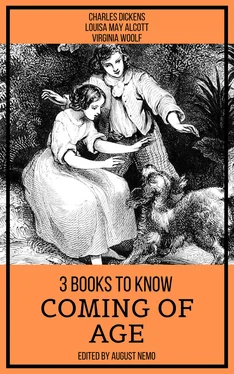"Yes," said I. "And Miss Estella—that's her niece, I think—handed her in cake and wine at the coach-window, on a gold plate. And we all had cake and wine on gold plates. And I got up behind the coach to eat mine, because she told me to."
"Was anybody else there?" asked Mr. Pumblechook.
"Four dogs," said I.
"Large or small?"
"Immense," said I. "And they fought for veal cutlets out of a silver basket."
Mr. Pumblechook and Mrs. Joe stared at one another again, in utter amazement. I was perfectly frantic—a reckless witness under the torture—and would have told them anything.
"Where was this coach, in the name of gracious?" asked my sister.
"In Miss Havisham's room." They stared again. "But there weren't any horses to it." I added this saving clause, in the moment of rejecting four richly caparisoned coursers which I had had wild thoughts of harnessing.
"Can this be possible, uncle?" asked Mrs. Joe. "What can the boy mean?"
"I'll tell you, Mum," said Mr. Pumblechook. "My opinion is, it's a sedan-chair. She's flighty, you know—very flighty—quite flighty enough to pass her days in a sedan-chair."
"Did you ever see her in it, uncle?" asked Mrs. Joe.
"How could I," he returned, forced to the admission, "when I never see her in my life? Never clapped eyes upon her!"
"Goodness, uncle! And yet you have spoken to her?"
"Why, don't you know," said Mr. Pumblechook, testily, "that when I have been there, I have been took up to the outside of her door, and the door has stood ajar, and she has spoke to me that way. Don't say you don't know that, Mum. Howsever, the boy went there to play. What did you play at, boy?"
"We played with flags," I said. (I beg to observe that I think of myself with amazement, when I recall the lies I told on this occasion.)
"Flags!" echoed my sister.
"Yes," said I. "Estella waved a blue flag, and I waved a red one, and Miss Havisham waved one sprinkled all over with little gold stars, out at the coach-window. And then we all waved our swords and hurrahed."
"Swords!" repeated my sister. "Where did you get swords from?"
"Out of a cupboard," said I. "And I saw pistols in it—and jam—and pills. And there was no daylight in the room, but it was all lighted up with candles."
"That's true, Mum," said Mr. Pumblechook, with a grave nod. "That's the state of the case, for that much I've seen myself." And then they both stared at me, and I, with an obtrusive show of artlessness on my countenance, stared at them, and plaited the right leg of my trousers with my right hand.
If they had asked me any more questions I should undoubtedly have betrayed myself, for I was even then on the point of mentioning that there was a balloon in the yard, and should have hazarded the statement but for my invention being divided between that phenomenon and a bear in the brewery. They were so much occupied, however, in discussing the marvels I had already presented for their consideration, that I escaped. The subject still held them when Joe came in from his work to have a cup of tea. To whom my sister, more for the relief of her own mind than for the gratification of his, related my pretended experiences.
Now, when I saw Joe open his blue eyes and roll them all round the kitchen in helpless amazement, I was overtaken by penitence; but only as regarded him—not in the least as regarded the other two. Towards Joe, and Joe only, I considered myself a young monster, while they sat debating what results would come to me from Miss Havisham's acquaintance and favour. They had no doubt that Miss Havisham would "do something" for me; their doubts related to the form that something would take. My sister stood out for "property." Mr. Pumblechook was in favour of a handsome premium for binding me apprentice to some genteel trade—say, the corn and seed trade, for instance. Joe fell into the deepest disgrace with both, for offering the bright suggestion that I might only be presented with one of the dogs who had fought for the veal-cutlets. "If a fool's head can't express better opinions than that," said my sister, "and you have got any work to do, you had better go and do it." So he went.
After Mr. Pumblechook had driven off, and when my sister was washing up, I stole into the forge to Joe, and remained by him until he had done for the night. Then I said, "Before the fire goes out, Joe, I should like to tell you something."
"Should you, Pip?" said Joe, drawing his shoeing-stool near the forge. "Then tell us. What is it, Pip?"
"Joe," said I, taking hold of his rolled-up shirt sleeve, and twisting it between my finger and thumb, "you remember all that about Miss Havisham's?"
"Remember?" said Joe. "I believe you! Wonderful!"
"It's a terrible thing, Joe; it ain't true."
"What are you telling of, Pip?" cried Joe, falling back in the greatest amazement. "You don't mean to say it's—"
"Yes I do; it's lies, Joe."
"But not all of it? Why sure you don't mean to say, Pip, that there was no black welwet coach?" For, I stood shaking my head. "But at least there was dogs, Pip? Come, Pip," said Joe, persuasively, "if there warn't no weal-cutlets, at least there was dogs?"
"No, Joe."
"A dog?" said Joe. "A puppy? Come?"
"No, Joe, there was nothing at all of the kind."
As I fixed my eyes hopelessly on Joe, Joe contemplated me in dismay. "Pip, old chap! This won't do, old fellow! I say! Where do you expect to go to?"
"It's terrible, Joe; an't it?"
"Terrible?" cried Joe. "Awful! What possessed you?"
"I don't know what possessed me, Joe," I replied, letting his shirt sleeve go, and sitting down in the ashes at his feet, hanging my head; "but I wish you hadn't taught me to call Knaves at cards, Jacks; and I wish my boots weren't so thick nor my hands so coarse."
And then I told Joe that I felt very miserable, and that I hadn't been able to explain myself to Mrs. Joe and Pumblechook who were so rude to me, and that there had been a beautiful young lady at Miss Havisham's who was dreadfully proud, and that she had said I was common, and that I knew I was common, and that I wished I was not common, and that the lies had come of it somehow, though I didn't know how.
This was a case of metaphysics, at least as difficult for Joe to deal with, as for me. But Joe took the case altogether out of the region of metaphysics, and by that means vanquished it.
"There's one thing you may be sure of, Pip," said Joe, after some rumination, "namely, that lies is lies. Howsever they come, they didn't ought to come, and they come from the father of lies, and work round to the same. Don't you tell no more of 'em, Pip. That ain't the way to get out of being common, old chap. And as to being common, I don't make it out at all clear. You are oncommon in some things. You're oncommon small. Likewise you're a oncommon scholar."
"No, I am ignorant and backward, Joe."
"Why, see what a letter you wrote last night! Wrote in print even! I've seen letters—Ah! and from gentlefolks!—that I'll swear weren't wrote in print," said Joe.
"I have learnt next to nothing, Joe. You think much of me. It's only that."
"Well, Pip," said Joe, "be it so or be it son't, you must be a common scholar afore you can be a oncommon one, I should hope! The king upon his throne, with his crown upon his 'ed, can't sit and write his acts of Parliament in print, without having begun, when he were a unpromoted Prince, with the alphabet—Ah!" added Joe, with a shake of the head that was full of meaning, "and begun at A too, and worked his way to Z. And I know what that is to do, though I can't say I've exactly done it."
There was some hope in this piece of wisdom, and it rather encouraged me.
"Whether common ones as to callings and earnings," pursued Joe, reflectively, "mightn't be the better of continuing for a keep company with common ones, instead of going out to play with oncommon ones—which reminds me to hope that there were a flag, perhaps?"
Читать дальше












